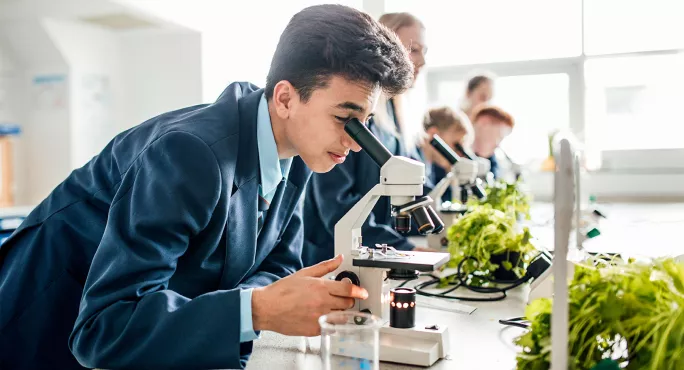The International Baccalaureate Middle Years Programme (IBMYP) goes back more than 30 years. It was first established as an initiative of the International Schools Association before being introduced as part of the IB continuum in 1994.
After a review, it was relaunched in 2014. Now there are more than 1,800 schools teaching the MYP in 127 countries.
The five-year curriculum is designed for students aged 11-16 and bridges the gap between the IB Primary Years Programme and Diploma Programme. As with all IB programmes, the MYP aims to develop students who are confident in leading their own learning and can apply that learning to a real-life global context.
All IB programmes centre on the learner profile, which outlines that IB students are inquirers, thinkers, communicators and risk-takers, who are principled, open-minded, caring, balanced and reflective.
Throughout the MYP, students are asked to identify the ways that they embody these traits.
IB Middle Years Programme
MYP subject groups
The MYP includes eight subject groups: language acquisition, language and literature, individuals and societies, sciences, mathematics, arts, physical and health education, and design. Students have a minimum of 50 hours of instruction per subject group in each academic year.
Language acquisition is a compulsory component of the MYP in every year of the programme. This is part of the IB’s dedication to creating a curriculum that develops students to thrive in a global workplace.
The MYP curriculum framework includes:
- Approaches to learning, which help students to learn how to learn by developing research skills, critical thinking, communication, collaboration and self-management.
- Key and related concepts, which help students to explore big ideas.
- Global contexts, which help students to recognise the relevance of their study for understanding the real world and its challenges.
The MYP culminates in an independent learning project. Students complete a significant piece of work over an extended period of time.
Assessment in the MYP
The MYP has attracted criticism for not including any externally moderated exams. In an attempt to avoid students focusing too much on their final grades, the IB prioritises students learning to learn rather than studying facts in order to pass exams.
More Tes guides:
However, in a move towards recognised external grading, from 2016 the IB introduced mandatory external moderation of students’ personal projects. It also now gives schools the chance to offer externally marked eAssessments.
Personal project
In Year 5 of the MYP, students complete the personal project, which is externally assessed.
The project assesses students’ approaches to learning and their skills for self-management, research, communication and critical and creative thinking. It also prepares them for the IB Diploma Programme and its core components, known as CAS (creativity, activity, service).
eAssessment
The MYP’s optional eAssessment consists of externally evaluated coursework portfolios and on-screen examinations.
The on-screen examination subjects are mathematics, language and literature, sciences and individuals and societies. Students engage with the exam through interactive on-screen tools, such as videos and software that plots graphs.
The portfolios can be created in arts, design, physical and health education, and language acquisition.
Find more about the IB Middle Years Programme here.
For essential weekly intelligence on the international schools sector, sign up for the Tes International newsletter





